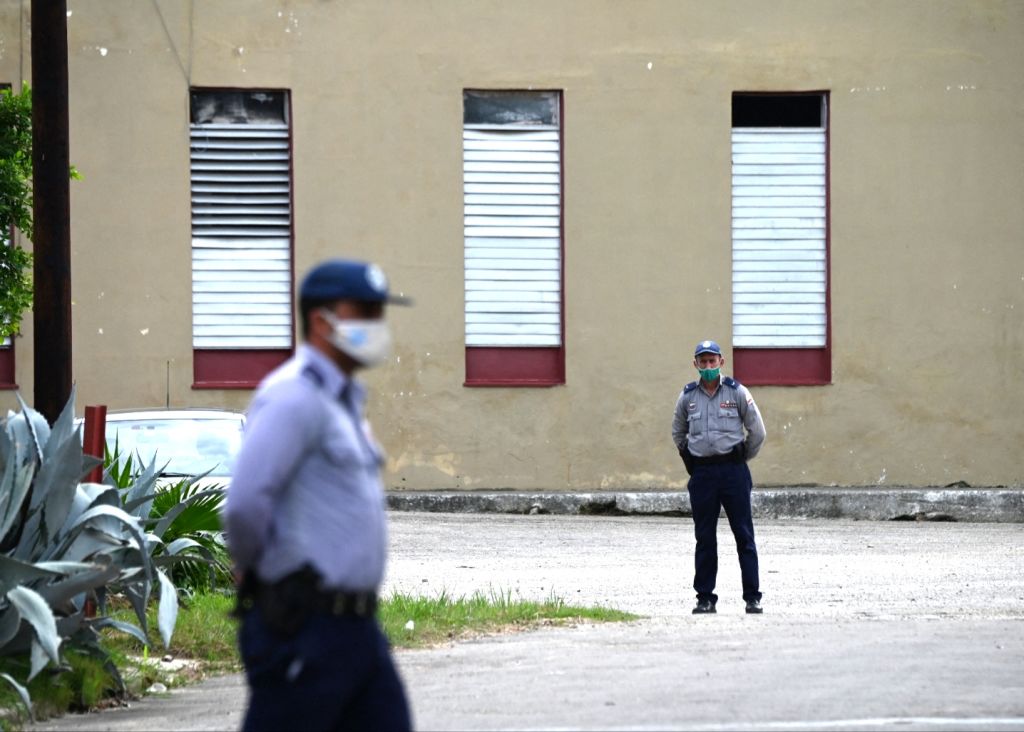Law & Politics
Two Dissident Artists Stood Trial in Cuba This Week. Despite Pleas From Human Rights Groups, They Could Face Years in Prison
Artist Luis Manuel Otero Alcántara and rapper Maykel Castillo each face lengthy prison sentences.

Artist Luis Manuel Otero Alcántara and rapper Maykel Castillo each face lengthy prison sentences.

Taylor Dafoe

An activist artist and a prominent rapper went to trial in Havana this week in a pair of cases that human rights organizations say are examples of Cuba’s growing push to silence dissident voices.
Artist Luis Manuel Otero Alcántara, who was arrested on his way to a Havana demonstration in July 2021, faces up to seven years in prison for charges of contempt, public disorder, and defaming the national flag, according to a court filing obtained by Reuters. Rapper Maykel Castillo, who was detained in May 2021, is accused of assault and may be sentenced to 10 years in prison.
Both men belong to the San Isidro Movement artist group and have remained in pretrial detention since their arrests. Alcántara, who has been arrested for speaking out against the state numerous times before, has waged two hunger strikes in protest of his treatment at a maximum-security penitentiary outside Havana.
Details about what transpired in the courtroom have been murky as members of the media and diplomats from Germany, Sweden, and other European countries were barred from entering. A verdict is expected in the next two weeks, according to NBC News.
In the weeks and days leading up to the trials, human rights organizations spoke out against the Cuban government and demanded the release of the two dissidents.
Cuban artists Luis Manuel Otero Alcántara and Maykel Castillo are set to stand trial on Monday. Concerned governments, especially from Latin America & Europe, should monitor the trial and call for the artists’ release.
Joint @HRW @amnesty news release: https://t.co/FJqf7dkJ9s
— Human Rights Watch (@hrw) May 29, 2022
“The unjust trials against Luis Manuel Otero Alcántara and Maykel Castillo Pérez are clear examples of how the Cuban authorities attempt to silence their own people,” said Romana Cacchioli, executive director of PEN International. “Although the authorities deny it, the world knows that these artists are innocent.”
Tamara Taraciuk Broner, the acting Americas director for Human Rights Watch, called the Cuban government’s actions a form of “extreme intolerance typical of brutal dictatorships in the region’s past.”
Castillo, who goes by the stage name Osorbo, was among the co-writers of the popular protest song “Patria y Vida,” which became the unofficial anthem of the mass protests that rocked Cuba in the summer of 2021, and won a Latin Grammy award this year. Translating to “Fatherland and Life,” the song’s title doubles as a rejection of the Fidel Castro-coined slogan “Fatherland or Death!”
A founding member of the San Isidro Movement, Alcántara has for years been among the most vocal opponents of the communist Cuban government under president Miguel Díaz-Canel. He was named to Time‘s list of the 100 most influential people in the world last September.
— coco fusco (@cocofusco1960) May 30, 2022
Earlier this month, Alcántara issued a statement from prison—his first since being detained last summer. The artist called his hunger strikes “visceral reactions provoked by the aberrant dictatorship” and explained that the government offered him exile from Cuba as the only way out of prison. It doesn’t sound like he plans to accept the deal.
“Today I dream that all Cubans of the world of any political persuasion will gather at the Malecon to work together toward a solution to the dictatorship so that no Cuban who thinks differently or espouses different political views will have to suffer mistreatment, persecution, or imprisonment.
In the country I dream of, the children of Cuba will not have to emigrate and will be able to fulfill their goals on the island or return whenever they wish,” he said. “I dream that no Cuban will be the enemy of any other Cuban.”
“Today for these dreams,” Alcántara continued, “I am ready to sacrifice the artist’s flesh, my artist’s flesh, and my freedom-loving spirit.”